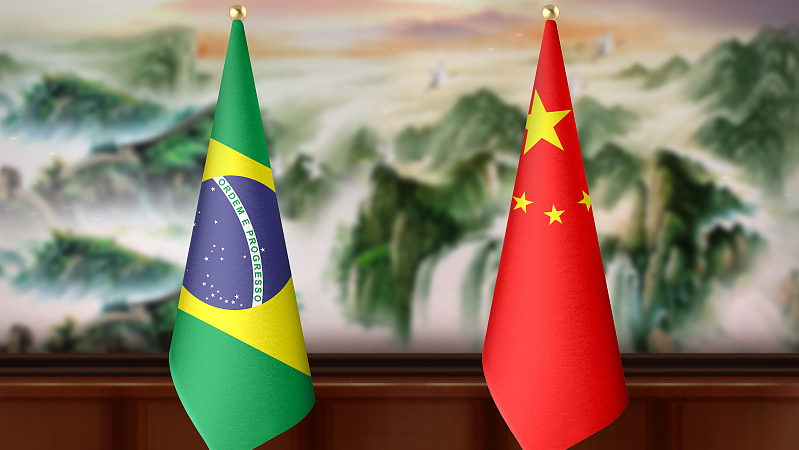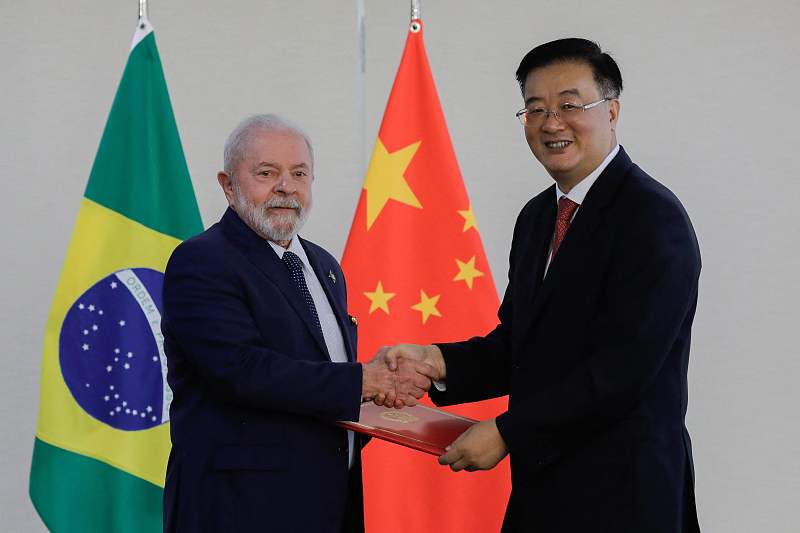
The national flags of China and Brazil. /CFP
The national flags of China and Brazil. /CFP
Editor's note: Evandro Menezes de Carvalho is the head of the Center for Brazil-China Studies at Getulio Vargas Foundation (FGV) Law School in Rio de Janeiro. The article reflects the author's opinions and not necessarily the views of CGTN.
According to Brazilian media reports, Brazilian President Luiz Inacio Lula da Silva, who is paying a state visit in China, is scheduled to meet with Chinese President Xi Jinping. The expected meeting between the two leaders is a fact that won't go unnoticed on the international scene, as both are leaders who brought about significant changes to their countries.
Now Lula has been reelected as the president 12 years after the end of his second term in 2011. In these 12 years, China has completed eradicating extreme poverty while consolidating a moderately prosperous society. China has become a significant trading partner for more than 140 countries and regions and is firmly on its way to leading the global economy. In these last 12 years, Brazil has suffered one of the most intense processes of self-sabotage of its growth. The country once again found millions of Brazilians living in extreme poverty and fell from sixth to 12th in the ranking of world economies.
Lula completed 100 days of government, which is a short time for a president who finds Brazil still with open wounds resulting from the internal political divisions caused during the years of Jair Bolsonaro's government. Lula assumes charge of a country with an even more conservative National Congress, an extreme right remaining a political force, a Central Bank in disarray with his government, and an economy that needs urgent attention. The room for the Brazilian president to maneuver at the beginning of his term is small. However, with some success, he is managing to open some ways.
In terms of foreign policy, Lula hopes to find solutions to domestic issues. His visit to Argentina and, later, to the U.S., followed the script expected of a Brazilian leader with responsible diplomacy. On his visit to Argentina, Lula signaled his commitment to strengthening the Community of Latin American and Caribbean States and Mercosur. His trip to the U.S. had symbolic objectives. Lula wanted to send a message to the Brazilian extreme right and to a portion (which we hope will be small) of the Brazilian armed forces that the U.S. respects the decision of the Brazilian people to have him as president. Also, Biden's government would not support any coup adventure.
However, Lula's trip to China is the most important of his first three international trips. China has been Brazil's biggest trading partner for 14 consecutive years with bilateral trade reaching $171.49 billion. The economic complementarity between the two countries makes this bilateral relationship more promising and less problematic than Brazil's relationship with the U.S.

Brazil's President Luiz Inacio Lula da Silva is presented with the credentials of China's ambassador to Brazil Zhu Qingqiao, at Planalto Palace in Brasilia, Brazil, February 3, 2023. /CFP
Brazil's President Luiz Inacio Lula da Silva is presented with the credentials of China's ambassador to Brazil Zhu Qingqiao, at Planalto Palace in Brasilia, Brazil, February 3, 2023. /CFP
It is in attracting Chinese investment to Brazil that Lula probably will direct his attention. After all, Brazil needs investments for its infrastructure, reindustrialization, development of its technology and innovation, and increased urban and inter-regional mobility.
What's worth mentioning is that China has developed successful urbanization efforts to build beautiful China that makes Chinese cities cleaner, safer, and more sustainable. These urbanization efforts connect with the country's regional integration through a vast railway network, highways, and airports. Based on this convenient transportation network, China has avoided excessive population concentration in merely a few major cities, bringing economic development to previously less developed regions.
These new urbanization efforts go hand in hand with rural revitalization. And urban-rural development in China translates the systemic view of development on the part of the Chinese government. Brazil, the fifth largest country in terms of territory, should learn from such Chinese development experiences.
Besides, leaders of China and Brazil understand that governing means putting people's well-being at the center of their concerns. In this sense, for the bilateral relationship to gain new impetus and stronger ties, the two countries must intensify exchanges between people, primarily cultural and educational interactions. All the wealth produced through trade and investments must aim at promoting connections between the two peoples.
The Brazilian president has high expectations for the expected meeting with his Chinese counterpart, and this is the reason why Lula's China visit is accompanied by a delegation of hundreds of businesspersons, alongside governors, congressmen and ministers, which shows how important China is to Brazil. But for this visit to have lasting results, it is necessary to establish real bonds of friendship via increasingly broad and frequent bilateral dialogue. The expected meeting between Xi and Lula signals a new chapter in the Chinese-Brazilian relationship.
(If you want to contribute and have specific expertise, please contact us at opinions@cgtn.com. Follow @thouse_opinions on Twitter to discover the latest commentaries in the CGTN Opinion Section.)